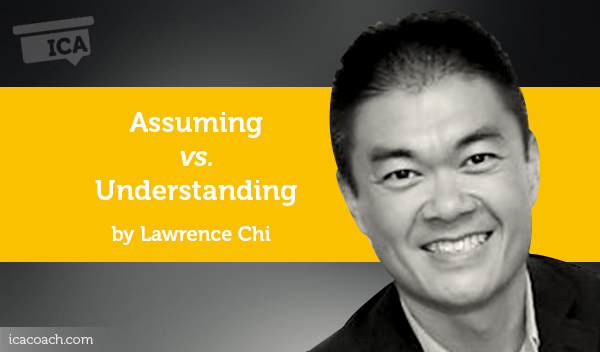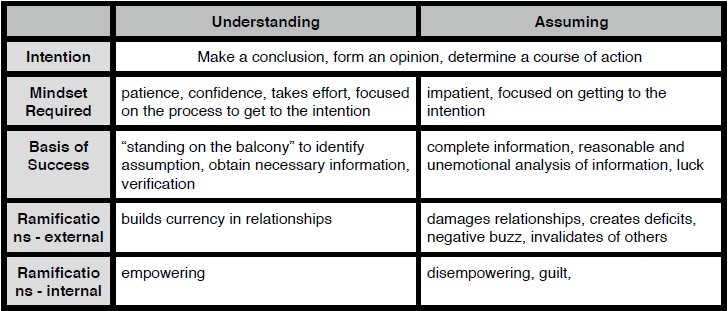
A Coaching Power Tool Created by Lawrence Chi
(Expatriate and Cross Cultural Coach, CANADA)
Introduction
A hotel executive was in the lobby of his hotel during a busy period to greet guests as they were returning from their day. He looked over at the Concierge desk and saw the Chief Concierge reading a newspaper with a coffee beside him on the counter. Drinking coffee and reading a newspaper on duty was unacceptable, especially when guest traffic was heavy!
The hotel exec was livid and scolded the Concierge for being inattentive and giving guests a poor image of the hotel. The Concierge returned a look, not of guilt, but of confusion and hurt. He explained that the coffee was a guest’s who had asked him to watch it while he used the lobby restroom and he was reading the paper because the same guest had asked him to check on movie listings for that evening.
The exec felt terrible – he accused the Concierge of wrong doing when in fact he was providing service to a guest. Thankfully, the Concierge found it within to be forgiving and their relationship recovered after that.
I was that hotel executive, so I feel a deep sense of guilt and remorse every time I recount this story. I valued my relationship with the Chief Concierge and within seconds, I had damaged it, dis-empowered myself by losing control and invalidated my friend’s efforts with his guest. I had learned the importance of making the effort to fully understand rather than jumping to quick assumptions. All this guilt could have been avoided if I had cleared my mind of any preconceptions and asked a simple question: why is there a coffee on the counter and why are you reading a newspaper?
The Mindsets of Assuming and Understanding
The frame of mind of making assumptions and seeking understanding both serve the purpose of determining cause to conclude effect. In both paradigms, information is processed with the intention of leading to a further action based upon that information. These actions are often making conclusions or forming an opinion. This is where the mindsets of making assumptions and seeking understanding deviate.
Making assumptions is a fast method of processing information. The mindset is focused on the point of view whereas the seeking understanding mindset is focused on the process to reach a point of view. People make assumptions when they take information and formulate an opinion or make a conclusion solely based upon their interpretation of only that initial information. There are instances when one can make the right assumption but two preconditions need to be satisfied: there is complete information and; there is reasonable and unemotional analysis of information. Of course, it is difficult to realize one of these preconditions let alone both. There is also a third precondition, luck, and to base the effectiveness of your communication and thus, relationships on serendipity is a risky proposition. You may be right but you will eventually be wrong.
Drawing the wrong conclusion through a series of assumptions has serious ramifications. Relationships are damaged, deficits are created and a negative buzz from others follow you. Internally, drawing wrong conclusions through assumptions is disempowering and often leads to an overwhelming sense of guilt.
Like many dis-empowering behaviours, making assumptions may not intentional and certainly not done with any malicious purpose. A self-aware individual is able to “stand on the balcony”, watch, recognize and rectify this behaviour. If individuals are not aware they are making assumptions, their mindset is reinforced to continue making more and bigger assumptions. Again, your assumption may be right but will eventually be wrong.
Seeking Understanding
The contrast to making assumptions is seeking understanding. Seeking to understand has been a key concept in self-awareness and personal growth since Covey’s seminal work, Seven Habits of Highly Effective People. Seeking understanding is an empowering state of mind because you are not just reacting to the information given to you but also take control of synthesizing the information. Seeking understanding is an effective way to earn currency in your relationship – it demonstrates that you are listening to the message, have a sincere intention to understand and even if you cannot reach full understanding, you have demonstrated an effort. Also, you may not necessarily agree with the message or information given but the point here is to listen and understand.
Seeking understanding is asking questions to gather additional information or to verify your current understanding. In gathering information, the listener has to focus so that they are not distracted by superfluous information. Validation is repeating the words back to the speaker and clarifying any misunderstanding or probe for additional details. An individual who successfully seeks understanding has the patience to gather information and the confidence to admit they don’t know what they don’t know. Furthermore, seeking understanding successfully also means ensuring there aren’t assumptions built into your questions. Those who make an effort to seek understanding will be successful in doing so. The closer you are to getting to the whole story, the closer you get to full understanding.
Assuming vs. Understanding
